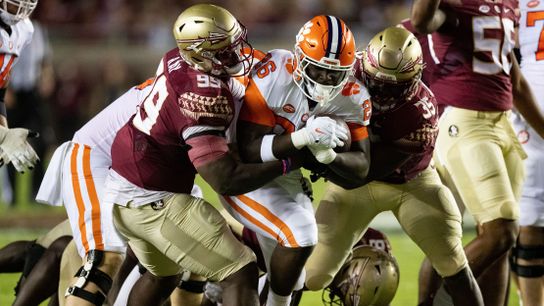The ACC's spring meetings are underway today in Florida, and Florida State AD Michael Alford is going in with a clear game plan.
Alford conducted an interview with Warchant over the weekend in which he reiterated his talking points from the winter -- that Florida State (along with Clemson and Miami) deserve a larger share of the pie than the rest of the conference.
“I make no bones about it that we’re the top brand in the conference,” Alford told the site. “And when you look at how they measure media contracts, with households, viewership and championships, we’re driving that viewership for our conference at a high rate.
“There are a couple schools that are really driving that media contract.”
The issue, of course, is the TV contract. In order for ESPN to fund the ACC Network, the ACC had to agree to a contract that runs through 2036. That security comes at a cost. The Big Ten, Big 12 and SEC all signed TV contracts after the ACC's current deal took effect, and all three will come up for bid again before the ACC gets another turn. The ACC could soon find itself more than $30 million behind the Big Two per year.
It's come to a point where Florida State looks jealously at UCF's TV deal.
“If you look at the revenue projections, they should have a better agreement than we have by going out to market,” Alford said. “That means there’s going to be another school in the state that’s going to have a better agreement than Miami and us. And that’s just not acceptable to us.”
The issue in May is the same that it was in February: what leverage does Florida State (and Clemson, and Miami) really have here?
All three are locked in to the ACC via a Grant of Rights through 2036. It's an open question how enforceable that contract is, but the fact that no one's tried to get out tells us a lot.
And even if FSU, Clemson and Miami get the other 11 ACC schools to slide a piece of their pie on to the Noles, Tigers and 'Canes plates, there's no guarantee that will change the long-term outlook of the conference. The Big 12 once had an unequal revenue share... and by 2024, half of the conference's original roster will have left for other leagues.
Alford's pitch to his colleagues likely goes something like this: The ACC has been our home for a generation now, and we'd like that to remain the case for generations to come. Florida State does not want to leave the ACC. But in order for us to fund a nationally competitive program, we have to be compensated according to our market value, or else, like Texas and Oklahoma and USC and UCLA, when the time comes we'll have no choice but to look for a new home when the time comes. So while it may hurt your pride in the short term, in the long term it's in the best interest of everyone in the room to pay us our market value.
And if I'm, say, Wake Forest AD John Currie, I'd listen to Alford's argument and find myself sympathetic to some of his arguments. I may even find myself agreeing with some of them. But I'd respond with one question: If we were to give you what you want, what's to stop you from leaving for the SEC or Big Ten in 2036 anyway?
My support would be contingent upon Florida State, Clemson and Miami agreeing to extend the ACC Grant of Rights even deeper into the future. I'd start with the year 2100, but that would just be a starting point for negotiations.
Either way, if I'm the other 11 ACC schools, I'd need the Noles, Tigers and Canes to put their commitment to the conference on paper before I'd even consider conceding even one penny.
